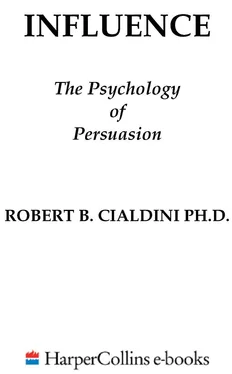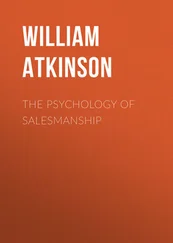In combination, the reality of internal discomfort and the possibility of external shame can produce a heavy psychological cost. When seen in the light of this cost, it is not so puzzling that we will often give back more than we have received in the name of reciprocity. Neither is it so odd that, as was shown in an experiment conducted at the University of Pittsburgh, people will often avoid asking for a needed favor if they will not be in a position to repay it. The psychological cost may simply outweigh the material loss.
The risk of still other kinds of losses may also persuade people to decline certain gifts and benefits. Women frequently comment on the uncomfortable sense of obligation they can feel to return the favors of a man who has given them an expensive present or paid for a costly evening out. Even something as small as the price of a drink can produce a feeling of debt. A student in one of my classes expressed it quite plainly in a paper she wrote: "After learning the hard way, I no longer let a guy I meet in a club buy my drinks because I don't want either of us to feel that I am obligated sexually." Research suggests that there is a basis for her concern. If, instead of paying for them herself, a woman allows a man to buy her drinks, she is immediately judged (by both men and women) as more sexually available to him.
RECIPROCAL CONCESSIONS
There is a second way to employ the reciprocity rule to get someone to comply with a request. It is more subtle than the direct route of providing that person with a favor and then asking for one in return; yet in some ways it is more devastatingly effective than the straightforward approach. A personal experience I had a few years ago gave me firsthand evidence of just how well this compliance technique works.
I was walking down the street when I was approached by an eleven-or twelve-year-old boy. He introduced himself and said that he was selling tickets to the annual Boy Scouts circus to be held on the upcoming Saturday night. He asked if I wished to buy any at five dollars apiece. Since one of the last places I wanted to spend Saturday evening was with the Boy Scouts, I declined. "Well," he said, "if you don't want to buy any tickets, how about buying some of our big chocolate bars? They're only a dollar each." I bought a couple and, right away, realized that something noteworthy had happened. I knew that to be the case because: (a) I do not like chocolate bars; (b) I do like dollars; (c) I was standing there with two of his chocolate bars; and (d) he was walking away with two of my dollars.
To try to understand precisely what had happened, I went to my office and called a meeting of my research assistants. In discussing the situation, we began to see how the reciprocity rule was implicated in my compliance with the request to buy the candy bars. The general rule says that a person who acts in a certain way toward us is entitled to a similar return action. We have already seen that one consequence of the rule is an obligation to repay favors we have received. Another consequence of the rule, however, is an obligation to make a concession to someone who has made a concession to us. As my research group thought about it, we realized that was exactly the position the Boy Scout had put me in. His request that I purchase some one-dollar chocolate bars had been put in the form of a concession on his part; it was presented as a retreat from his request that I buy some five-dollar tickets. If I were to live up to the dictates of the reciprocation rule, there had to be a concession on my part. As we have seen, there was such a concession: I changed from noncompliant to compliant when he changed from a larger to a smaller request, even though I was not really interested in either of the things he offered.
It was a classic example of how a weapon of automatic influence can infuse a compliance request with its power. I had been moved to buy something not because of any favorable feelings toward the item, but because the purchase request had been presented in a way that drew force from the reciprocity rule. It had not mattered that I do not like chocolate bars; the Boy Scout had made a concession to me, click, and, whirr, I responded with a concession of my own. Of course, the tendency to reciprocate a concession is not so strong that it will invariably work in all instances on all people; none of the weapons of influence considered in this book is that strong. However, in my exchange with the Boy Scout, the tendency had been sufficiently potent to leave me in mystified possession of a pair of unwanted and overpriced candy bars.
Why should I feel a strain to reciprocate a concession? The answer rests once again in the benefit of such a tendency to the society. It is in the interests of any human group to have its members working together toward the achievement of common goals. However, in many social interactions the participants begin with requirements and demands that are unacceptable to one another. Thus the society must arrange to have these initial, incompatible desires set aside for the sake of socially beneficial cooperation. This is accomplished through procedures that promote compromise. Mutual concession is one important such procedure.
The reciprocation rule brings about mutual concession in two ways. The first is obvious. It pressures the recipient of an already-made concession to respond in kind. The second, while not so obvious, is pivotally important. Just as in the case of favors, gifts, or aid, the obligation to reciprocate a concession encourages the creation of socially desirable arrangements by ensuring that anyone seeking to start such an arrangement will not be exploited. After all, if there were no social obligation to reciprocate a concession, who would want to make the first sacrifice? To do so would be to risk giving up something and getting nothing back. However, with the rule in effect, we can feel safe making the first sacrifice to our partner, who is obligated to offer a return sacrifice.
Because the rule for reciprocation governs the compromise process, it is possible to use an initial concession as part of a highly effective compliance technique. The technique is a simple one that we can call the rejection-then-retreat technique. Suppose you want me to agree to a certain request. One way to increase your chances would be first to make a larger request of me, one that I will most likely turn down. Then, after I have refused, you would make the smaller request that you were really interested in all along. Provided that you have structured your requests skillfully, I should view your second request as a concession to me and should feel inclined to respond with a concession of my own, the only one I would have immediately open to me—compliance with your second request.
Was that how the Boy Scout got me to buy his candy bars? Was his retreat from the five-dollar request to the one-dollar request an artificial one that was intentionally designed to sell candy bars? As one who has still refused to discard even his first Scout merit badge, I genuinely hope not. But whether or not the large-request-then-smaller-request sequence was planned, its effect was the same, It worked. And because it works, the rejection-then-retreat technique can and will be used purposely by certain people to get their way. First let's examine how this tactic can be used as a reliable compliance device. Later we will see how it is already being used. Finally we can turn to a pair of little-known features of the technique that make it one of the most pervasively influential compliance tactics available.
Remember that after my encounter with the Boy Scout, I called my research assistants together to try to understand what had happened to me and, as it turned out, to eat the evidence. Actually, we did more than that. We designed an experiment to test the effectiveness of the procedure of moving to a desired request after a larger preliminary request had been refused. We had two primary purposes in conducting the experiment. First, we wanted to see whether this procedure worked on people besides myself. That is, it certainly seemed that the tactic had been effective when tried on me earlier in the day; but then, I have a history of falling for compliance tricks of all sorts. So the question remained, Does the rejection-then-retreat technique work on enough people to make it a useful procedure for gaining compliance? If so, it would definitely be something to be aware of in the future.
Читать дальше












